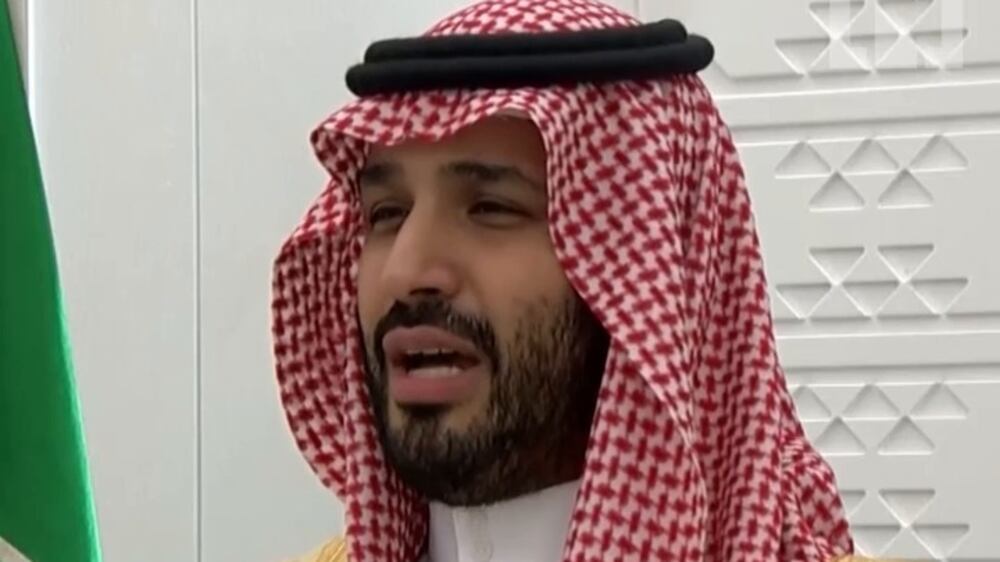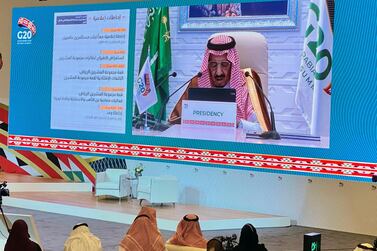The Group of 20 rose to the challenge of protecting lives and livelihoods amid an unprecedented crisis this year, and adopted policies for a resilient economic recovery, Saudi Arabia’s King Salman said.
“We have achieved a lot this year,” King Salman said in his concluding remarks at this year’s G20 leaders’ summit, for which Riyadh held the presidency.
"We have upheld our commitment to continue to work together to rise to the challenge of the Covid-19 pandemic.
“We have adopted important policies that will achieve recovery all the way to an economy that is resilient, sustainable, inclusive and balanced.”
The two-day summit, held online, was hosted by Saudi Arabia under the theme of Realising Opportunities of the 21st Century for All.
The kingdom, the only Arab state to be part of the G20, has handed the rotating presidency to Italy for 2021.
The actions introduced by the world’s 20 biggest economies will also maintain efforts to make “the global trade system work for all”, and create the conditions for sustainable economic development, King Salman said.
In his opening remarks on Saturday, he said trade was a key to economic revival and urged G20 leaders to continue supporting the still-shaky global recovery.
The G20 on Sunday said it was committed to a fair distribution of Covid-19 vaccines around the world, a critical step in fighting the pandemic and reviving economic growth.
G20 leaders also pledged to support poorer nations struggling under heavy debt.
Covid-19 has infected almost 59 million people and killed more than 1.39 million, data from Worldometer shows.
G20 members in June pledged more than $21 billion towards diagnostics, vaccines and therapies to fight the pandemic.
The G20 has succeeded in sending a message of “hope and reassurance” to people around the world, King Salman said.
“This is what the world has been expecting from us,” he said.
He stressed that the G20 would remain committed to creating the conditions for affordable and equitable access to Covid-19 vaccines, therapies and diagnostic tools.
The summit was the second time G20 leaders have met this year after an online gathering in March, at which they pledged to “spare no efforts” to overcome the pandemic.
Since then, governments have introduced nearly $12 trillion in fiscal stimulus, supported by about $7.5tn in monetary action by central banks.
These steps have supported the world's financial markets, protected businesses and jobs and put a floor under the global economy.
In his closing remarks, King Salman said the $12tn was "an unprecedented stimulus".
And more than $300bn has been raised by development banks, the International Monetary Fund and the World Bank, which are working with the G20 to assist emerging and low-income countries.
Saudi Crown Prince Mohammed bin Salman restated the kingdom’s commitment to battle climate change and land degradation, and to energy, environment and Riyadh Initiative on the Future of the World Trade Organisation to provide necessary support for its reforms.
Some developed nations have already showed signs of a better-than-expected economic growth that was better than expected in the third quarter.
But the IMF still expects global output to shrink 4.4 per cent this year and recover only modestly in 2021.
“Our joint and individual actions will be critical in overcoming the immediate global challenge we are facing,” King Salman said.
The G20 consists of 19 countries – Argentina, Australia, Brazil, Canada, China, France, Germany, India, Indonesia, Italy, Japan, Mexico, Russia, Saudi Arabia, South Africa, Republic of Korea, Turkey, the UK and the US – and the EU.
Officials from international organisations including the IMF and the World Bank, attended the two-day summit alongside regional bodies such as the Arab Monetary Fund, the Islamic Development Bank and the African Union.
The UAE, as the chair of the six-member GCC, also attended.







